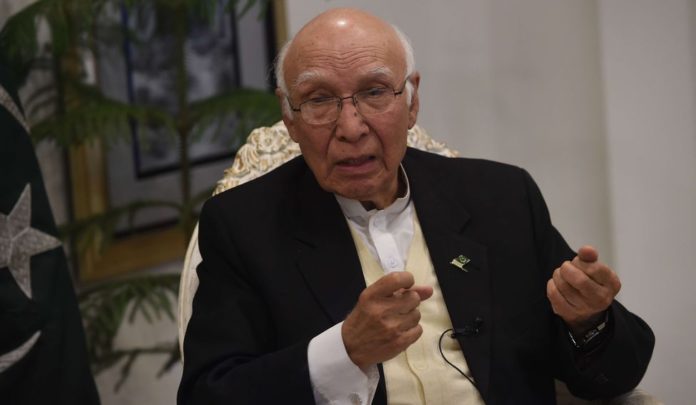‘A knowledge corridor under CPEC will help Pakistan bridge the gap between artificial intelligence and technology’
ISLAMABAD: Former finance minister Sartaj Aziz has said that the China-Pakistan Economic Corridor (CPEC) is a win-win arrangement for both Pakistan and China and that all the projects under CPEC must be materialised without any delay, as it would lead to industrialisation in Pakistan.
He was speaking at the Opening Plenary of 21st Sustainable Development Conference (SDC) organised by Sustainable Development Policy Institute (SDPI) on Wednesday.
Aziz said CPEC is not only a package of road and energy projects, but also a tool of connectivity among think tanks, public and private sector, common people, and ideas.
In order to achieve successful transformation from trade to knowledge corridor, he said, it is important to take confidence building measures among all the stakeholders.
“The real challenge of the 21st century is artificial intelligence and technological upheaval, which has taken over the physical existence of the labour force. However, at the same time, it could bring prosperity in the society as a whole,” he added.
Aziz maintained that technology is going to transform the job market and the real challenge is how Pakistanis prepare themselves to take up this challenge. He stressed the need to build a knowledge corridor under CPEC which would help Pakistan bridge the gap between artificial intelligence and technology.
About the issue of climate change South Asia is facing today, he said the real issue is of Pakistan’s capacity to tackle the dire implication of climate change. “Water is an important part of climate change and we need to go beyond building dams, which is water security, water course lining, drip irrigation, and water management,” the former minister suggested.
He said that the existing irrigation practices are not compatible as 60 per cent of Pakistan’s freshwater resources are being consumed. “Planning for affordable energy resources is another challenge to tackle and we need to concentrate on agriculture sector which will help increase our exports as well as agricultural trade,” he added.
In his introductory speech, SDPI Executive Director Dr Abid Qaiyum Suleri said one of the objectives of this 21st edition of SDC is to highlight the importance of knowledge connectivity among three culturally and academically rich regions, i.e. South Asia, Central Asia, and China. He said that one of the prerequisites for knowledge corridors is intellectual and academic interaction, where CPEC has the potential to link South Asia to China and Central Asia. However, in order to get maximum benefit out of this economic corridor, Dr Suleri said, Pakistan needs to build a knowledge corridor with China and Central Asia.
“In order to harness the full potential of emerging economic corridors, governments in South Asia must take specific initiatives within the new policy paradigm for pursuing peace, overcoming poverty and protecting the life support systems of the planet,” he recommended.
Board of Investment Chairman Haroon Sharif on the occasion said that it is important to reflect upon the reasons why South Asia was lagging behind capitalizing its true potential of trade, connectivity, and investments. “The opportune time will not come by its own, and we have to create and strive for the right time to move,” he remarked.
The lens with which the developed world used to look at South Asian countries is changing from security to huge market for trade and investments, he said, adding that this transition from geo-political and security lens to economic lens is putting Pakistan back on track of growth and development.
He said the economies in West Asia, East Asia and beyond are now looking towards South Asia in terms of improved and enhanced economic relations. He also stressed the need to look at Pakistan’s capability to handle the demands of the emerging markets.
Sharif said that economic diplomacy has emerged as a major tool in this region for peaceful coexistence and traditional diplomacy is changing rapidly, where narrative is building and the nations are talking about peace and prosperity.




